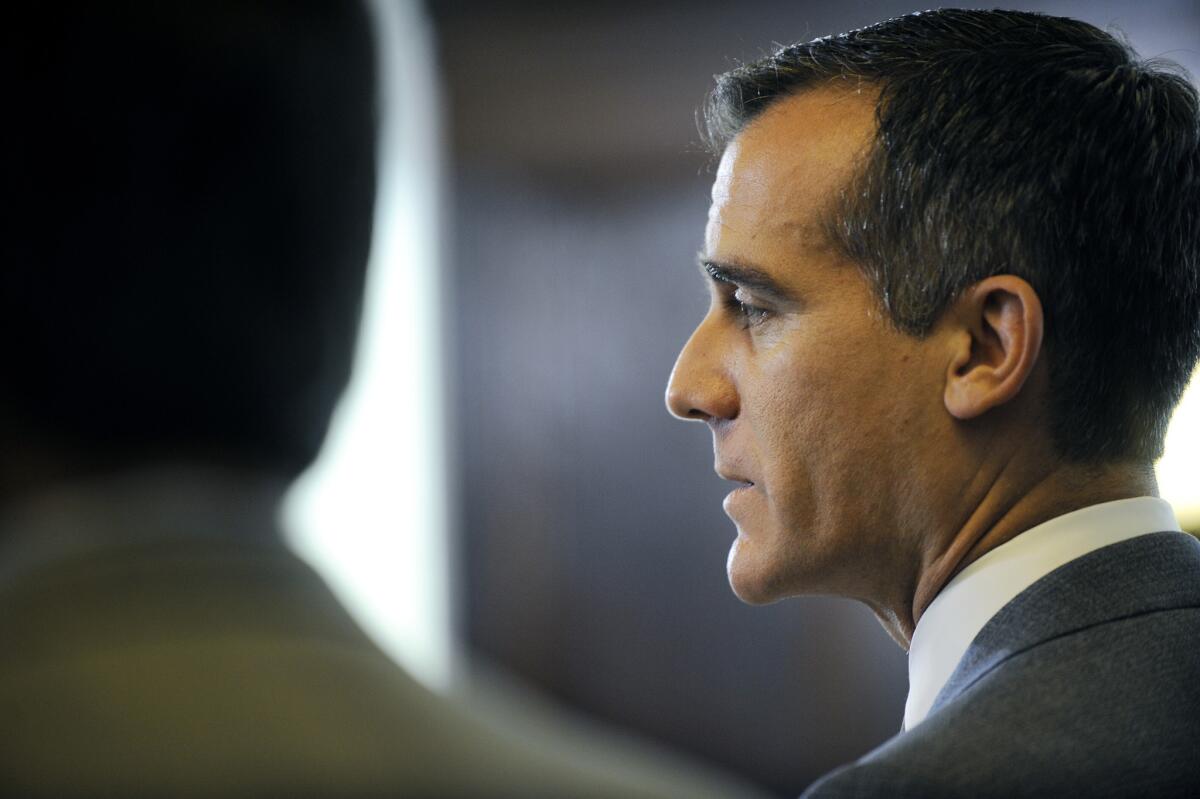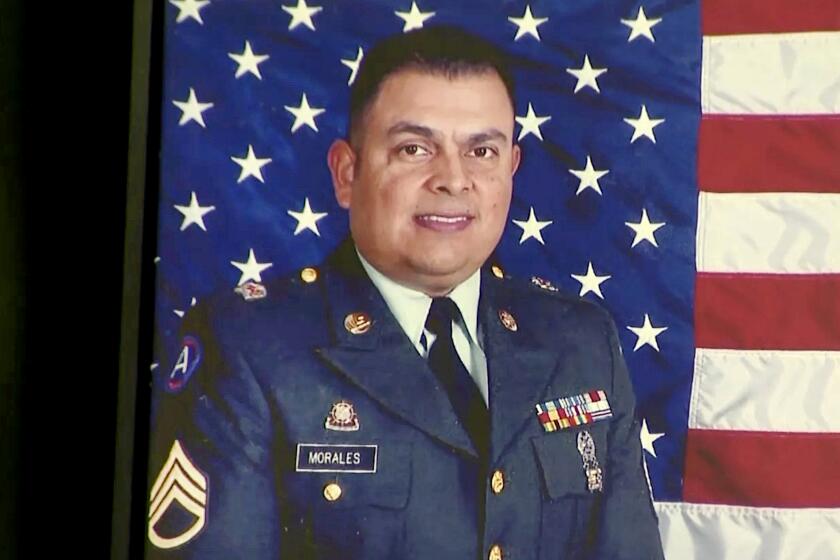Minimum wage hike sidetracked by labor leaders pushing to exempt union members

Mayor
The path toward passage of Los Angeles’ landmark minimum wage increase took a rocky detour Wednesday, as business and elected officials reacted harshly to a last-minute push by labor leaders to create an exemption for companies with unionized workforces.
Union officials have been among the most ardent backers of the plan approved by the L.A. City Council last week to raise the minimum wage to $15 an hour. But some labor leaders who opposed loopholes for small businesses and restaurants now argue that unionized companies should have leeway to negotiate lower pay rates with their employees.
The suggested addition to the wage-increase plan drew sharp criticism from some in the business community, who said it would pressure employers seeking relief from rising labor costs to strike collective bargaining agreements. Even some who fought side-by-side with union activists for the wage increase said they were uncomfortable adopting the proposed exemption without further study.
“For me, the point of the minimum wage in Los Angeles was to raise wages and lift people out of poverty,” said Councilman Mike Bonin, a champion of the ordinance and frequent labor ally on the council. The pay hike should apply for “everyone,” he said, including “employees of big businesses and small businesses, of nonprofits and for-profits, people who are members of unions and people who are not.”
Bonin’s view was at odds with that of Rusty Hicks, head of the Los Angeles County Federation of Labor and a leader of the Raise the Wage coalition. Hicks said in a statement that companies whose workers collectively bargain for a wage below the city-mandated minimum shouldn’t be penalized.
He and other supporters of the exemption argue that a collective bargaining agreement should allow workers and businesses freedom to focus not only on pay but on other forms of compensation, such as retirement and health benefits. “This is a standard clause to protect basic worker rights,” Hicks said in his statement .
Critics complained that labor leaders were unwilling to extend similar considerations to small-business owners, who have warned they would struggle financially to comply with the law. When the plan passed a key council committee this month, Hicks said that “it is critical that no Angeleno — whether they’re workers or owners of small businesses and nonprofits — is left behind.”
“It’s insane hypocrisy,” said restaurant owner George Abou-Daoud, who lobbied unsuccessfully for changes to the wage-increase plan. “The unions have put forth an agenda that they themselves don’t have to comply with.”
Language similar to that sought by Hicks was included in the $15.37 minimum wage the city approved last year for workers at large hotels. Margo Feinberg, an attorney for the local labor groups, said that if the city failed to include a waiver for unionized workers it could be more vulnerable to legal challenges under federal labor law, which guarantees private-sector employees a right to collective bargaining.
“We have no desire to undermine the ordinance,” Feinberg said.
Some — but not all — cities that have established higher minimum wages in recent years provided a union worker exemption. San Francisco, Chicago and Oakland did; Seattle did not.
L.A.’s minimum wage would gradually rise from the current $9 to $15 by 2020, with a one-year delay for employers with 25 or fewer workers and for some nonprofits.
Like other aspects of the pending law, the potential effects of adding a collective-bargaining exemption are unclear.
Many employees who are now unionized might not be affected. The average hourly wage for L.A. union workers was $27.50, according to a 2014 study by the UCLA Institute for Research on Labor and Employment. Chris Tilly, director of the institute, said the exemption would most likely come into play for non-union workers who try to organize after the ordinance is passed.
Some suggest the provision sought by labor leaders is a thinly veiled effort to boost unions’ membership.
“Last week it was all about pumping their fists and saying, ‘No subminimum wage.’ This week it’s all about giving employers and employees the right for a subminimum wage. I think that’s a huge contradiction,” said Councilman Mitch O’Farrell, who voted for the wage increase.
“Approving the minimum wage to lift people out of poverty is one thing,” he said. “The City Council becoming a vehicle for organized labor to unionize private industry is entirely something else.”
The proposed exemption is the latest controversy to erupt in the final throes of a debate that has stretched over nine months of news conferences, protests, public hearings and City Council discussions. Last week, when the council voted 14 to 1 to approve the wage-increase plan, it simultaneously backtracked on an 11th-hour addition that could have forced employers to give workers as many as 12 paid days off each year.
On Friday, the council’s Economic Development Committee is scheduled to take up a draft of the ordinance written by the city attorney’s office. Some council members, including Bonin, say they think any exemption for unionized workers should be tabled for study so the rest of the wage ordinance can advance.
Speaking with reporters Wednesday, Mayor Eric Garcetti declined to take a position on the exemption sought by labor leaders, but said he’s open to examining it.
“I think a lot of people have opinions, whether it’s business or labor, or stakeholders. We’ll always listen to that,” Garcetti said. “But what’s moving forward is something that doesn’t have [a waiver for unionized workers] in it.”
More to Read
Start your day right
Sign up for Essential California for news, features and recommendations from the L.A. Times and beyond in your inbox six days a week.
You may occasionally receive promotional content from the Los Angeles Times.









